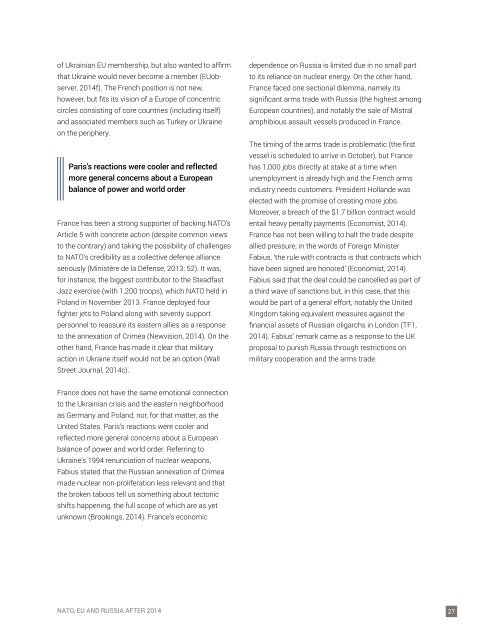You also want an ePaper? Increase the reach of your titles
YUMPU automatically turns print PDFs into web optimized ePapers that Google loves.
of Ukrainian EU membership, but also wanted to affirm<br />
that Ukraine would never become a member (EUobserver,<br />
2014f). The French position is not new,<br />
however, but fits its vision of a Europe of concentric<br />
circles consisting of core countries (including itself)<br />
and associated members such as Turkey or Ukraine<br />
on the periphery.<br />
Paris’s reactions were cooler and reflected<br />
more general concerns about a European<br />
balance of power and world order<br />
France has been a strong supporter of backing NATO’s<br />
Article 5 with concrete action (despite common views<br />
to the contrary) and taking the possibility of challenges<br />
to NATO’s credibility as a collective defense alliance<br />
seriously (Ministère de la Défense, 2013: 52). It was,<br />
for instance, the biggest contributor to the Steadfast<br />
Jazz exercise (with 1,200 troops), which NATO held in<br />
Poland in November 2013. France deployed four<br />
fighter jets to Poland along with seventy support<br />
personnel to reassure its eastern allies as a response<br />
to the annexation of Crimea (Newvision, 2014). On the<br />
other hand, France has made it clear that military<br />
action in Ukraine itself would not be an option (Wall<br />
Street Journal, 2014c).<br />
dependence on Russia is limited due in no small part<br />
to its reliance on nuclear energy. On the other hand,<br />
France faced one sectional dilemma, namely its<br />
significant arms trade with Russia (the highest among<br />
European countries), and notably the sale of Mistral<br />
amphibious assault vessels produced in France.<br />
The timing of the arms trade is problematic (the first<br />
vessel is scheduled to arrive in October), but France<br />
has 1,000 jobs directly at stake at a time when<br />
unemployment is already high and the French arms<br />
industry needs customers. President Hollande was<br />
elected with the promise of creating more jobs.<br />
Moreover, a breach of the $1.7 billion contract would<br />
entail heavy penalty payments (Economist, 2014).<br />
France has not been willing to halt the trade despite<br />
allied pressure; in the words of Foreign Minister<br />
Fabius, ‘the rule with contracts is that contracts which<br />
have been signed are honored’ (Economist, 2014).<br />
Fabius said that the deal could be cancelled as part of<br />
a third wave of sanctions but, in this case, that this<br />
would be part of a general effort, notably the United<br />
Kingdom taking equivalent measures against the<br />
financial assets of Russian oligarchs in London (TF1,<br />
2014). Fabius’ remark came as a response to the UK<br />
proposal to punish Russia through restrictions on<br />
military cooperation and the arms trade.<br />
France does not have the same emotional connection<br />
to the Ukrainian crisis and the eastern neighborhood<br />
as Germany and Poland, nor, for that matter, as the<br />
United States. Paris’s reactions were cooler and<br />
reflected more general concerns about a European<br />
balance of power and world order. Referring to<br />
Ukraine’s 1994 renunciation of nuclear weapons,<br />
Fabius stated that the Russian annexation of Crimea<br />
made nuclear non-proliferation less relevant and that<br />
the broken taboos tell us something about tectonic<br />
shifts happening, the full scope of which are as yet<br />
unknown (Brookings, 2014). France’s economic<br />
NATO, EU and Russia after 2014 27


